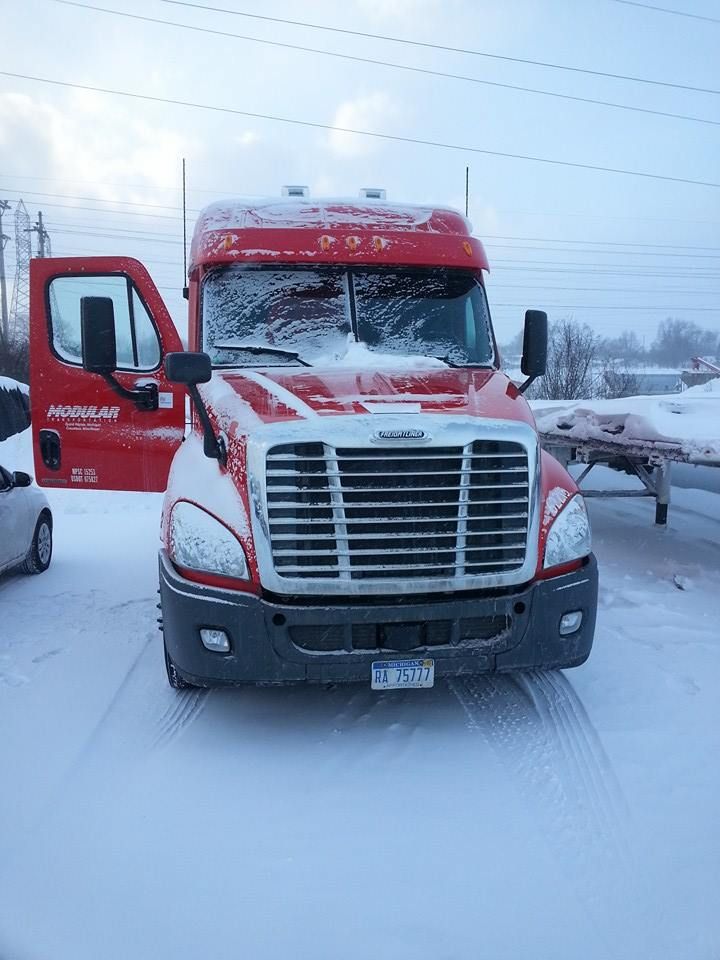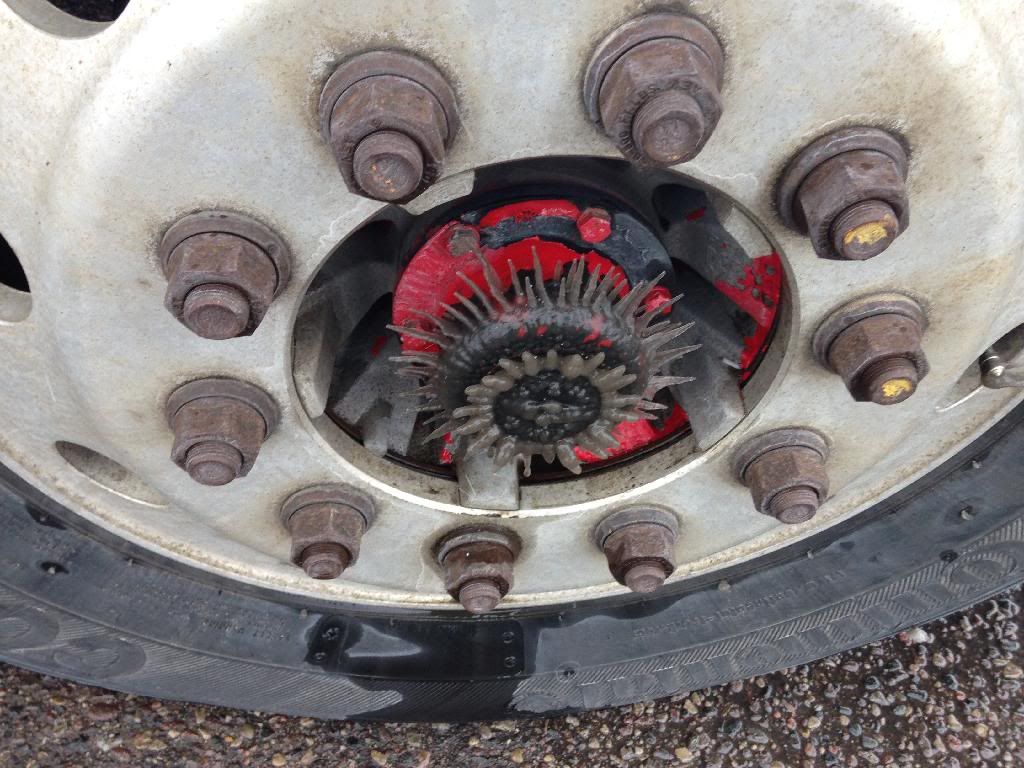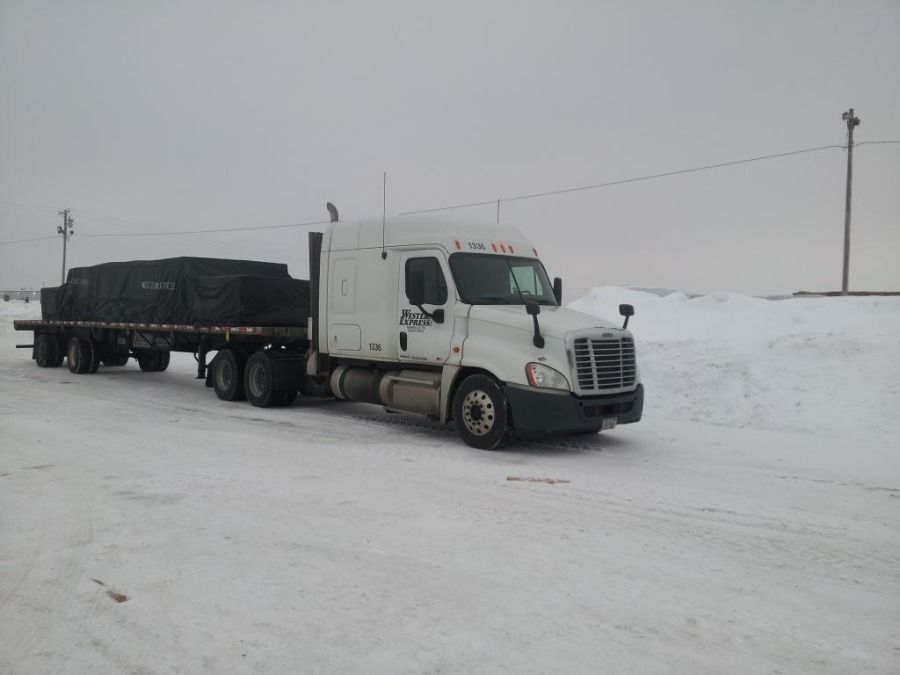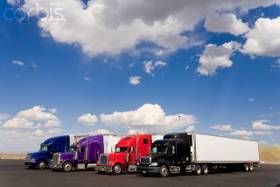Flatbed Vs Dry Van
Topic 2768 | Page 1

Never did flatbed but done a lot of dry van. Dry van has a whole lot of drop and hook which saves on load/unload times. Now there can be some live load or unload but not as much as other freight types. No tarping.
Dry van normally has short runs 700 to 1100 miles but you you get more loads so the miles equal up being the same.
Remember that -30 and -40 degree weather this year a few times? Yea did not have to get out and tarp.
Dry Van:
A trailer or truck that that requires no special attention, such as refrigeration, that hauls regular palletted, boxed, or floor-loaded freight. The most common type of trailer in trucking.Drop And Hook:
Drop and hook means the driver will drop one trailer and hook to another one.
In order to speed up the pickup and delivery process a driver may be instructed to drop their empty trailer and hook to one that is already loaded, or drop their loaded trailer and hook to one that is already empty. That way the driver will not have to wait for a trailer to be loaded or unloaded.

Never did flatbed but done a lot of dry van. Dry van has a whole lot of drop and hook which saves on load/unload times. Now there can be some live load or unload but not as much as other freight types. No tarping.
Dry van normally has short runs 700 to 1100 miles but you you get more loads so the miles equal up being the same.
Remember that -30 and -40 degree weather this year a few times? Yea did not have to get out and tarp.
I envy that lol
Dry Van:
A trailer or truck that that requires no special attention, such as refrigeration, that hauls regular palletted, boxed, or floor-loaded freight. The most common type of trailer in trucking.Drop And Hook:
Drop and hook means the driver will drop one trailer and hook to another one.
In order to speed up the pickup and delivery process a driver may be instructed to drop their empty trailer and hook to one that is already loaded, or drop their loaded trailer and hook to one that is already empty. That way the driver will not have to wait for a trailer to be loaded or unloaded.
I wrote a series of eight articles in our category of articles about How To Choose A Trucking Company which covers the differences between the various types of freight. Here's a couple of them:
Dry Van Versus Refrigerated Companies
Tanker Versus Flatbed Companies
Dry Van:
A trailer or truck that that requires no special attention, such as refrigeration, that hauls regular palletted, boxed, or floor-loaded freight. The most common type of trailer in trucking.OOS:
When a violation by either a driver or company is confirmed, an out-of-service order removes either the driver or the vehicle from the roadway until the violation is corrected.
While I'm partial to the flat-bed work that I enjoy immensely, I don't want to influence your decision. But I remembered an old thread from some time back where all this stuff was discussed concerning the Pros and Cons of different types of Trucking Jobs. Check it out, you may find some helpful information there.
Reefer:
A refrigerated trailer.

Thanks for the links. I like the idea of the exercise with flatbeds. n the other side of that I HATE being cold! Guess I should invest in some warm clothing if I decide to go with a skateboard.

Unlike Old School, I will put a little influence out there. Remember it is only cold for a short part of the year. If you have good gear you are less likely to get cold. I find that only my hands really get cold and that seems to be when doing the bungies. You generate lots of heat when dealing with tarps. I love 1) the physical work, 2) the mental work of securement and 3) how my driving day is broken up by the requirement to check the load and tires. Had a little bit of experience with dry van and really don't miss the wait times that frequently happened.
However, flat bed isn't all cake and candles either. In the summer it is hot dirty work and I find I can't get that shower every day that I would like. Some of the places you go are less than "improved". To me, it is all part of the adventure. To others it might be Hell on Earth.
Dry Van:
A trailer or truck that that requires no special attention, such as refrigeration, that hauls regular palletted, boxed, or floor-loaded freight. The most common type of trailer in trucking.
For a new person into trucking, which is better? Should I start with dry van just to get my feet wet so to speak or should I just dive right into what I think I will like best. Roehl pays $12 to tarp and $22 to untarp plus 0.35CPM to start. Is that good for starting out? They also give quarterly pay raises. By the end of the year, if everything goes well, I should be up to 0.40 to 0.45 CPM. Thoughts? I really am kind of leaning towards flatbeds.
Dry Van:
A trailer or truck that that requires no special attention, such as refrigeration, that hauls regular palletted, boxed, or floor-loaded freight. The most common type of trailer in trucking.CPM:
Cents Per Mile
Drivers are often paid by the mile and it's given in cents per mile, or cpm.
Hey, I agree completely with Larry. Here is where I unloaded at this morning. It took me exactly 56 minutes (I timed myself) to get my tarps off and put away so I could get unloaded. The weather here is cold (Otsego Michigan) but I had my insulated coveralls on and I was sweating down inside there. I too enjoy the physical work, I always have enjoyed physical work. You'll get plenty of it doing flat-bed, but you'll also get plenty of miles. I've been running like crazy here lately, and it's supposed to be slow right now.

I love this flat-bed work, and Larry is right about the summer being worse than the winter. Or maybe it's just because we are a couple of old farts that just can't take the heat anymore!

When we bought our first truck and trailer, it was a reefer , and we pulled that trailer for 2 years, or so....I hated it...I swear, they don't even plant that stuff, before they call and have a load ready...cuz you sure end up waiting alot to get loaded, and unloaded. And if fuel economy is an issue, you will really enjoy sitting in a dirt lot, with the cb on, getting the interior of the truck filthy, cuz the windows are down, cuz its hot, and you don't want to run the engine to try and keep your fuel use down.....for hours...and hours ....and hours... Flat bedding may be work intensive, it may get you dirty, you may have to get out in the cold, and wrestle with frozen tarps....and you may have to trow chains and binders, and straps...And in the summer its hot, and you get dirty, and your sweat bucket fulls... But I'll take ALL OF THAT...to ever doin' the reefer thing again....And I didn't even mention sitting at receivers waiting for that phantom lumper crew to make their way to you trailer.....
Dry box...we've never pulled one. But we hauled alot of dry goods in our reefer...It was ok... But I'd still rather pull a skateboard.....
Old flatbedders never die...they just get retarped !!!!
Reefer:
A refrigerated trailer.
New Reply:
New! Check out our help videos for a better understanding of our forum features

















Preview:
This topic has the following tags:
Choosing A Trucking Company







 TT On Facebook
TT On Facebook
What are the pro's and con's of a flatbed?
What are the pro's and con's of a dry van?
Dry Van:
A trailer or truck that that requires no special attention, such as refrigeration, that hauls regular palletted, boxed, or floor-loaded freight. The most common type of trailer in trucking.